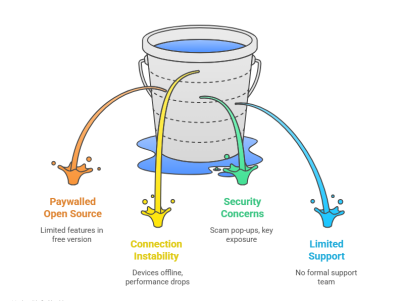5 Best RustDesk Alternatives in 2025 (Free & Paid)
RustDesk is a popular open-source, self-hosted remote desktop solution that aims to provide a free alternative to commercial remote access tools like TeamViewer or AnyDesk. It has attracted many users, especially those who prefer open-source and self-hosted software for privacy or cost reasons. However, as RustDesk grows, more users, especially IT admins and enterprise teams, are noticing its limitations in scalability, reliability, and long-term support. Many businesses need solutions that can handle larger device fleets, stricter compliance requirements, and stable performance.
If you need something more secure, scalable, or business-ready, just keep reading and we’ll provide 5 best RustDesk alternatives to consider in 2025.
1Why Look for a RustDesk Alternative?
RustDesk has built an active and supportive community, and many users appreciate its open-source model and self-hosted flexibility. For small teams or personal use, it often does the job well.
However, as more businesses and IT departments adopt it, real-world feedback has revealed a different side of the experience. On Reddit, GitHub, and other tech forums, users have shared frustrations about feature limitations, connection issues, and the lack of formal support. These concerns highlight why many organizations are now looking for more stable and scalable RustDesk alternatives for 2025.

1. When “Open Source” Starts to Feel Paywalled
RustDesk began as a fully open-source project, but many users have noticed that some important features are now limited to paid plans. The web client, for example, is available only to paying subscribers, surprising those who expected full access in the free version. Likewise, custom client builds and self-hosted web components require higher-tier subscriptions, which reduces flexibility for people running their own servers.
The pricing model has also caused confusion, as it’s not always clear which parts of RustDesk are truly free and which fall under the commercial offering.
2. Connection Issues That Affect Everyday Use
Many users have mentioned connection instability, where devices appear offline or fail to connect, especially when using relay servers.
Others have struggled with NAT traversal, which can make it hard to connect devices on the same local network. Even when things work well, performance can suddenly drop, making RustDesk unreliable for consistent daily operations.
3. Questions About Security and Safety
A few users have reported encountering scam pop-ups or phishing attempts after installing RustDesk. These incidents may not be directly related to the software itself, but they have still made some people cautious about its safety.
There are also concerns about server key exposure when setting up custom clients, since sharing keys can open the door to potential security risks.
4. Limited Support and Transparency
Because RustDesk is community-driven, users usually rely on forums and GitHub discussions when they run into problems. There’s no formal support team or SLA to guarantee response times. Some users have also voiced frustration about deleted feedback threads and unclear communication from the developers regarding which features will remain open-source in the future.
| Category | Key Issue | Impact |
|---|---|---|
| Commercialization | Paid access to web client and custom builds | Limited open-source flexibility |
| Reliability | Frequent connection or NAT issues | Interrupts remote sessions |
| Security | Risk of key sharing and scams | Raises data protection concerns |
| Support | No formal help channels | Slower problem resolution |
For SMBs or IT admins managing hundreds of Android devices or remote kiosks, these issues can lead to unnecessary downtime and risk. An enterprise-grade remote access solution offers stronger security, monitoring, and centralized management.
25 Best RustDesk Alternatives (2025 Update)
1. TeamViewer — Best for Cross-Platform Remote Support

- ✅ Supports Windows, macOS, Linux, Android and iOS
- ✅ Unattended access and multi-user sessions
- ✅ File transfer and screen sharing
- ✅ 256-bit AES encryption + two-factor authentication
- ✅ Centralized admin console and reporting
| Website | https://www.teamviewer.com |
| Pricing | Free for personal use; commercial licenses start around US $24.9 per month per user (billed annually). |
2. AnyDesk — Best for Lightweight Remote Access

- ✅ Extremely low latency and fast connection speed
- ✅ Cross-platform compatibility (Windows, macOS, Linux, Android, iOS)
- ✅ Unattended and on-demand remote access
- ✅ Custom clients and branding options (Pro plans)
- ✅ Mobile and tablet support
| Website | https://anydesk.com |
| Pricing | Free for personal use; paid plans start around US $14 per month per seat (≈ US $168 per year). |
3. Splashtop — Best for Remote IT Support Teams

- ✅ Multi-user support and remote session management
- ✅ Unattended access and remote reboot
- ✅ File transfer and chat during sessions
- ✅ Centralized admin console and reporting
- ✅ SOC 2 Type II and GDPR compliance
| Website | https://www.splashtop.com |
| Pricing | Plans start from $3 per month per user; free trials available. |
4. Zoho Assist — Best for SMB Remote Helpdesk Integration

- ✅ 100% web-based remote sessions (no installation)
- ✅ File transfer, chat, and multi-monitor navigation
- ✅ Unattended access for remote maintenance
- ✅ Role-based permissions and session logging
- ✅ Native integration with Zoho CRM and Desk
| Website | https://www.zoho.com/assist |
| Pricing | Free plan available; paid plans start around US $15 per month per technician (billed annually). |
5. Chrome Remote Desktop — Best Free Cloud Option

- ✅ Works through any Chrome browser or Chromebook
- ✅ Quick screen sharing and remote control
- ✅ No installation beyond a browser extension
- ✅ Uses Google account authentication
- ✅ Multi-device support (desktop and mobile)
| Website | https://remotedesktop.google.com |
| Pricing | Completely free for all users. |
3Bonus Pick: AirDroid Business - Ideal for Managing Android Devices
For organizations that primarily manage Android devices such as tablets, kiosks, and POS terminals, AirDroid Business offers a comprehensive enterprise-grade remote management solution. It combines remote control, device monitoring, and policy management in one platform. Its focus on Android environments makes it particularly useful for retail, logistics, and field service operations.
Key features of AirDroid Business
✅ Unattended remote access and control for Android devices
✅ Black-Screen Mode for privacy during sessions
✅ Remote camera and voice chat for on-site troubleshooting
✅ Kiosk Mode (single / multi-app lockdown)
✅ Real-time device monitoring and alerts
✅ Content Management Service (CMS) for digital signage updates
| Website | https://www.airdroid.com/business/ |
| Pricing | Provide 14-day free trial |
3FAQs About Rustdesk Alternatives
1. Is RustDesk still free?
Yes, RustDesk remains free and open-source for basic use, but several features like the web client and branded builds are now part of paid plans.
2. Which RustDesk alternative is best for businesses?
For enterprise-grade management and Android fleets, AirDroid Business or TeamViewer Tensor are more suitable than RustDesk.
3. What is the most lightweight RustDesk competitor?
AnyDesk is one of the fastest and most resource-efficient options for personal and small business use.
4. Can I use RustDesk alternatives for Android remote access?
Yes. AirDroid Business is optimized for Android device control, monitoring, and kiosk management.
5. Are there secure, web-based RustDesk alternatives?
Tools like Zoho Assist and Splashtop provide encrypted, browser-accessible remote sessions for teams that prefer web-based connectivity.

